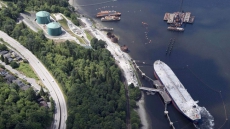OTTAWA — Justin Trudeau says his government remains committed to getting the Trans Mountain pipeline expansion built and also to its national climate-change plan — both of which were put in jeopardy by a bombshell court ruling that overturned federal approval for the project.
The government intends to move forward to get the pipeline expansion built "in the right way," the prime minister said Friday, indicating that the government accepts the Federal Court of Appeal's criticism of the approval process.
The court ruled Thursday that the National Energy Board's environmental assessment of the project was fatally flawed because it ignored the potential impact of increased oil tanker traffic off British Columbia's coast. It also ruled that the federal government had not fulfilled its duty to meaningfully consult with affected Indigenous groups.
"We are taking the time now to understand the court ruling, which addresses two things that are very important to this government — getting the science and the environmental protections right and making sure we are walking forward in a true path of reconciliation and partnership with Indigenous Peoples," Trudeau said after an event in Oshawa, Ont.
"We're going to continue to move forward to get this pipeline built in the right way by acknowledging what the court has said."
Indeed, the federal government's $4.5-billion purchase of the pipeline and expansion project from Kinder Morgan was finalized Friday. The government initiated the purchase last spring, after Kinder Morgan concluded the political and legal uncertainties surrounding the project rendered it too risky for its shareholders.
The expansion, aimed at getting Alberta's oilsands bitumen to B.C.'s coast where it can be shipped to overseas markets, would triple the capacity of the Trans Mountain pipeline between Edmonton and Burnaby to 890,000 barrels a day, and would increase the number of tankers in Burrard Inlet seven-fold.
Thursday's court ruling prompted Alberta Premier Rachel Notley to announce that her province is withdrawing from the controversial national climate change plan and will stay out until the federal government gets its act together, as she put it. Without Alberta, Notley asserted, the national plan "isn't worth the paper it's written on."
But Trudeau suggested Notley's move doesn't alter the federal commitment to the national climate change plan — or have any impact on it for at least a few years.
The federal plan requires provinces and territories to put a price on carbon emissions — through a cap and trade system, a carbon tax or some hybrid scheme — of at least $20 per tonne, starting Jan. 1. The minimum price will rise by $10 per tonne every year until it reaches $50 per tonne in 2022.
The federal government intends to impose a carbon price on any province that fails to come up with its own carbon pricing scheme — including Alberta if need be, Trudeau indicated.
"I've always said, if there are provinces that don't want to participate in this climate change plan, the federal government will do it alone."
However, he said that won't be an immediate issue with Alberta since that province's carbon pricing plan remains in place and "is equivalent to the targets set by the federal government, at least for the next few years."
Notley's government started imposing a $20-per-tonne carbon tax last year, which rose to $30 per tonne this year. Until 2021, Alberta's price will be higher than or equal to the federal targets.
That could change if Notley loses next year's provincial election. Jason Kenney, United Conservative party leader and front-runner in opinion polls at the moment, has vowed to scrap the province's carbon tax and join Saskatchewan and Ontario in a legal challenge to the federal climate plan.




